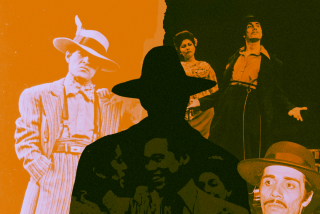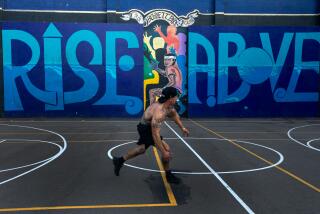Celebrations Help Unite Community, Despite Obscure Stereotypes : American Basques Find Time to Honor Mystery of Their Roots
- Share via
BUFFALO, Wyo. — From the lonely alpine grasslands of Wyoming to the lively streets of San Francisco, American Basques are celebrating a renaissance of ethnic traditions that trace back to a Stone Age mystery.
Throughout the western United States these hearty people who hail from the Pyrenees Mountains along the border between France and Spain have formed social clubs where they can speak their own language, eat spicy chorizo sausages and sweetbreads drenched in garlic, drink vinegary red wine and anisette coffee and share a heritage that has baffled scholars for centuries.
About 75,000 to 100,000 Americans have Basque blood. Although they are commonly referred to as Basques, they call themselves Eskualdunak, and Eskualherria is the term for their native land.
Helped Discover New World?
Most live in the West, blending into Elko and Mountain Home, Bakersfield and Winnemucca, where they live as solid citizens and patriots. They take great pride in claiming that Basque sailors helped discover the New World.
“About 20 of Christopher Columbus’ crewmen were Bizcainos, or Basque people,” says Dr. Pat Bieter, a professor at Boise State University in Idaho and an expert on Basque migration.
South American hero Simon Bolivar and Ferdinand Magellan’s first mate, Juan Sebastian del Cano, were also Basques. Others came to California from Mexico with Spanish explorers in the 1600s and 1700s.
“The real influx didn’t begin until the middle of the last century, with the Gold Rush,” Bieter says. A move by disgruntled California lawmakers to tax non-citizen miners prompted the Basques to turn to agriculture in the rich Central Valley.
Still tucked away in some slow-to-change Western neighborhoods, usually near a railroad station where passenger trains don’t stop anymore, are a few Basque boarding houses. A century ago they were filled with many young shepherds fresh off the boat, trying to get a start in a strange new country.
Brothers Followed Brothers
Each American Basque family is only one or two generations removed from a patriarch who crossed America by train with only a few coins in his pocket and a sign around his neck stating his destination in English so the conductor could tell him where to get off. Brothers followed brothers, cousins trailed cousins, to the vast sheep range of the Great Basin, where Basques took their wages in old ewes and began building their own herds one animal at a time.
From those fledgling flocks many Basques went on to acquire big ranches and, in some cases, great wealth accumulated by frugal living. Many native Basque women also came alone to America to work in boarding houses and restaurants and marry the transplanted shepherds.
Two stereotypes of American Basques obscure their true collective character today.
One is a lingering romantic notion, both in their European homeland on the Iberian Peninsula and in this country, that has been fostered by books and movies. It portrays them as tranquil farmers tending herds and flocks, drinking copious amounts of wine from their leather pouches and singing sad songs.
Voltaire Took Notice
Voltaire described them as “the people who dwell, or rather who dance, at the foot of the Pyrenees.”
“We passed lots of Basques with oxen, or cattle, hauling carts along the road, and nice farmhouses, low roofs and all white-plastered,” wrote Ernest Hemingway in “The Sun Also Rises.” “In the Basque country the land all looks very rich and green and the houses and villages look well-off and clean.”
Bieter estimates that today as few as 10% of American Basques are in the sheep business, the main reason their parents and grandparents came to this country. Basques now are found at all economic, educational and social levels, and include former Republican Sen. Paul Laxalt of Nevada and Idaho’s Secretary of State Pete Cenarrusa.
The other stereotype of Basques stems from their nationalist movement in their homeland, carried forward by ETA, a violence-prone guerrilla group fighting for an independent Basque nation for its 3.2 million people in an area about the size of Maine.
Feelings Persist
“Just as American Jews feel they have two homelands, one here and one in Israel, so many American Basques feel something like that,” says Bieter, an Irishman whose wife, Eloise, is a first-generation American of Basque parents. “Support for the separatist group ETA among American Basques is minimal, but it is there. That is why the North American Basque Organization (NABO) has prohibited any political discussion or activity within its group. It is too divisive to allow it.”
Basques are united by distinct physical characteristics, including a large incidence of type O blood with a high RH negative factor, and a low proportion of type B blood. All Basques consider themselves “noble,” because they were knighted as a nation for services at the ancient battle of Las Navas de Tolosa.
Because American Basques are so scattered in their adopted land, they try hard to hold on to traditions that link them as an ethnic entity. NABO was founded in 1974 to promote Basque culture and help keep the language alive. Twenty local Basque clubs have been organized in five states, the District of Columbia and Canada. They range from the opulent San Francisco complex that employs a native Basque chef to a small group of sheepherders that meets to play cards and dance here in Buffalo.
Zest for Hard Work
But longtime neighbors and non-Basque spouses believe it is their zest for hard work and their scrupulous honesty that sets them apart.
“Work has always been the way to recognition, the most important element in Basque culture,” Bieter says. “Next comes family, loyalty to relatives all the way past third cousins. And then there is honesty. If you’re caught being dishonest or lazy, your reputation is gone. Much of the Basque culture is based on integrity.”
American Basques, like their European relatives who run with the bulls at the Festival of San Fermin at Pamplona, also love parties.
Every summer NABO sponsors a festival of traditional singing and dancing, feasting and a special Basque Roman Catholic Mass. The two-day celebration is like a giant family reunion where Basques renew friendships, throw off the cares of a modern, mostly urban life and show off their cooking, shepherding and musical talents.
This year the festival attracted about 4,000 people to Buffalo, doubling its population and helping local ranchers take their minds off too much summer heat and no rain.
Simon Iberlin, the local chairman who organized the event, is a retired sheepman. With his black, deep-set eyes, high cheekbones, olive skin and strong torso, Iberlin looks 10 years younger than his 66 years. He spent the festival hobbling on crutches because he’d just broken his pelvis “in an argument with a stubborn horse who wanted to throw me off. I refused to go.”
Like most Basques, Iberlin takes a strange sort of pride in the mystery of Basque origins.
“It gives me a chance to come up with all kinds of theories about where we came from,” he says with a grin. “Some people think we come from the lost city of Atlantis. Others say we were the first to be Christianized. Perhaps we came from the Caspian Sea area in southern Russia. It’s my theory that we are related to the Irish. We have the same traits and customs, our farming practices are identical and we have the same black moods.”
Basques will tell you their ancestors can be traced back to the Middle Paleolithic age of about 70,000 years ago and lived in the Pyrenees thousands of years before modern Europeans arrived.
Iberlin, like many older Basques whose parents were immigrants, learned to speak the native language before English.
Called Eskuara, the Basque language is considered autochthonous--original and isolated from any other verbal communication on Earth. Legends claim that it was spoken by Adam and Eve and that one of the Adamic-speaking sons of Noah settled in the mountains before the confusion of tongues at the Tower of Babel. Basques like to claim that the Devil himself tried to learn it, but after eavesdropping seven years behind a door, he gave up knowing only the word bai , meaning yes. Perhaps, say the storytellers, he even lost his teeth in the ordeal.
Father Jean-Pierre Etcheverry is a Catholic priest from Europe who is serving three years as cleric to America’s Basques. Based in San Francisco, he drives thousands of miles to officiate at weddings, funerals and festivals throughout the West. He was an honored guest in Buffalo.
“The Basque community asked the church for its own priest and the first one came over from Europe in 1960,” Etcheverry says in heavily accented English. “I am the sixth priest to come. At first it was very hard because I had no English and there were such long travels. I try to serve 4,000 Basque families scattered all over the place. But now I love it, it is a wonderful job, the people are so wonderful. I am truly blessed.”
Throughout the festival, the smoky air was rich with the scent of sizzling sausage and lamb burgers cooking on grills. Some food booths offered strong cheeses and coarse, dense Basque bread for sale. Other stalls sold wool blankets and crafts, photographs of sheep and shepherds, and Basque souvenirs imported from Europe.
The festival’s first day was highlighted by a Main Street parade of antique sheep wagons.
Nearly every wagon had been the canvas-covered, 11-by-6-foot first home of an immigrant Basque couple. Many wagons were hauled down from the nearby Big Horn mountains where they are still used every summer as a shepherd’s home while tending flocks.
The last day of the gathering was devoted to God in the morning and dogs in the afternoon. An outdoor Mass in a log band shell, the altar decorated with whiskey barrels overflowing with petunias, was partly conducted in Basque. A brass band, its members dressed in red, white and green costumes, trumpeted fanfares to herald highlights. Next came a picnic and a sheepherding contest to choose the best work dog.
Dollie Iberlin, in her book “The Basque Web,” wrote of her husband Simon’s and his people’s heritage:
“God was there every Sunday and always the sheep, the sheep. The yearly cycles of shearing, lambing, docking, trailing, shipping and breeding of sheep structured their lives. Money came in only twice a year; but love, laughter, and practical duties filled their lives. Their heritage left to their children . . . is impressive.”
More to Read
Sign up for Essential California
The most important California stories and recommendations in your inbox every morning.
You may occasionally receive promotional content from the Los Angeles Times.













